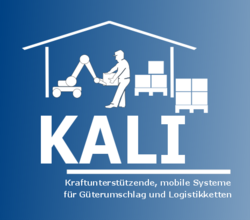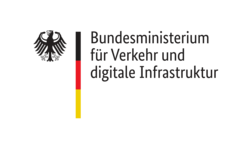KALI
Force-assisted, mobile systems for cargo handling and logistic chain

The project KALI conceived mobile support systems for port-related logistics. The aim is to optimize the working conditions in manual cargo handling and logistic in order to reduce physical stress and to improve the logistics processes. Not only the technical feasibility, mobility and modularity of the identified solutions are in the focus, but also the security and acceptance of workers as well as the related ethical, social and legal issues.
| Duration: | 01.09.2017 till 28.02.2019 |
| Donee: | German Research Center for Artificial Intelligence GmbH |
| Sponsor: | Federal Ministry of Transport and Digital Infrastructure |
| Grant number: | 19H17014B |
| Partner: |
BLG LOGISTICS GROUP AG & Co. KG
YOUSE GmbH Berlin |
| Application Field: |
Assistance- and Rehabilitation Systems
Logistics, Production and Consumer |
| Related Projects: |
COROMA
Cognitively enhanced robot for flexible manufacturing of metal and composite parts
(10.2016-
09.2019)
D-Rock
Models, methods and tools for the model based software development of robots
(06.2015-
05.2018)
FourByThree
Highly customizable robotic solutions for effective and safe human robot collaboration in manufacturing applications
(12.2014-
11.2017)
Hybr‐iT
Hybrid and intelligent human-robot collaboration – Hybrid teams in versatile cyber-physical production environments
(11.2016-
10.2019)
Recupera REHA
Full-body exoskeleton for upper body robotic assistance
(09.2014-
12.2017)
Capio
Dual-arm exoskeleton
(01.2011-
12.2013)
|
Project details
Based on specific applications in various areas of port logistics, manual activities and work steps are identified, analyzed and evaluated. At the end of the user-centered process there is a concept which ensures load-oriented human support. The support will be realized through a technical system which relies on close human-robot cooperation in heterogeneous logistical activities.
The system will be designed to minimize the physiological and informational burden in the daily work, to improve the work environment and to make a sustainable work possible. For this purpose a modular concept needs to be developed that cover all relevant requirements. Equally, measures will be developed to increase the acceptance of the users, the employers' liability insurance association, insurance, and works council. Furthermore, an economic analysis will be considers the profitability of the developed concept. The project results will outline the final concept in a CAD model. Moreover, an animation of the scenario and the developed concept clarifies the application potentials.
Videos
KALI: Force-assisted, mobile systems for cargo handling and logistic chain

